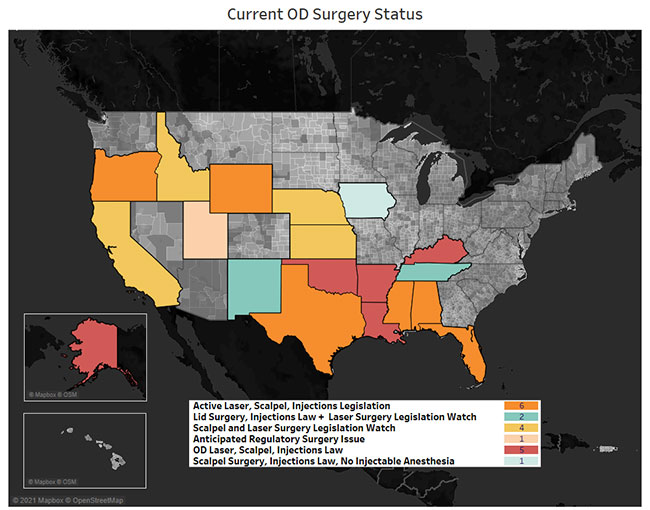In January, the Academy held its annual (virtual) Federal Affairs Secretariat meeting to recap the major events of the previous year and set our agenda going forward as an organization. We remain vigilant and aware that there are many more battles on the horizon in 2021.
1. Scope Expansion
Scope-of-practice expansion will once again be on the docket in 2021. Several states saw scope battles in 2020. Our big loss occurred in the state of Arkansas where a referendum to put optometric scope expansion on the November ballot was blocked by courts last minute on a technicality.
So far, five states allow optometrists to perform laser and scalpel surgeries and two states allow scalpel surgery but no lasers.
Several scope battles are on the horizon for 2021. Two states, Florida and Mississippi, already have active legislation submitted to their respective state legislatures for scope expansion this calendar year. These scope battles affect all of us and will be likely coming to your state in the future. The Surgical Scope Fund and educating our patients are the best lines of defense again scope expansion. Donate to the Surgical Scope Fund!

2. Medicare Cuts (Again)
Although curbing Medicare cuts were featured among the big wins for last year, the battle will continue in 2021. We're urging the Senate and House to extend the suspension of 2% sequestration cuts on Medicare. They're scheduled resume April 1 if Congress doesn’t act.
The Academy is asking members to voice their support for an extension. Use the Academy’s online tool to ask your federal legislators for support.
3. Drug Reimbursement
In September 2020, President Trump signed the Most Favored Nation executive order into law. Under the order, CMS will switch to a payment model based on the lowest international price. Instead of reimbursing for the average sales price plus 6%, CMS will pay providers the lowest price plus a flat fee adjusted quarterly for inflation.
This changes the reimbursement calculation for 50 drugs, including Eylea and Lucentis. Compounded drugs such as Avastin are excluded. The new Most Favored Nation allowable reimbursement means an estimated 12% reduction in reimbursement for Eylea and an 18% reduction for Lucentis. Several lawsuits, including one by Regeneron, have been filed against the Most Favored Nation executive order and are currently being evaluated in courts.
President Biden has tabled discussion on the Most Favored Nation drug model for now.
We have a challenging year ahead of us, and we’ll keep you posted on other issues that affect our profession.
About the author: Roman Krivochenitser, MD, is an ophthalmologist at the Colorado Eye Institute in Colorado Springs, Colo. He completed his residency at the University of Wisconsin and a glaucoma fellowship at the Kellogg Eye Center at the University of Michigan. As a resident, Dr. Krivochenitser was instrumental in establishing a young ophthalmologists group in Wisconsin and has been an Advocacy Ambassador for the Academy for the past three years. He is currently serving on the YO Advocacy Subcommittee.